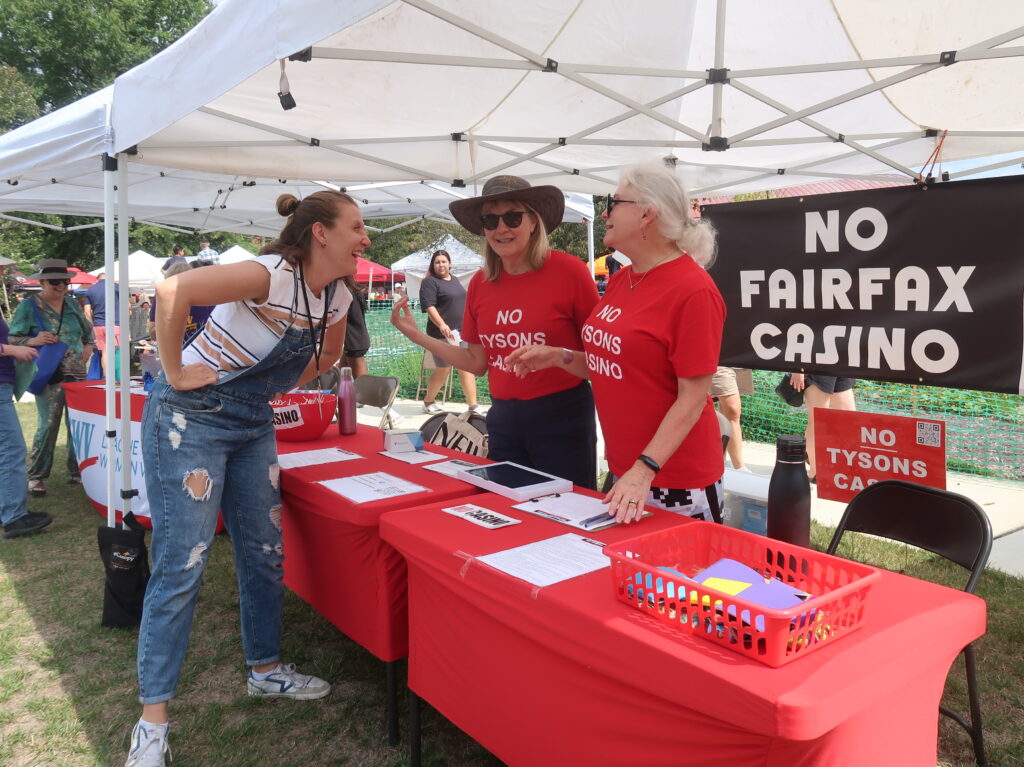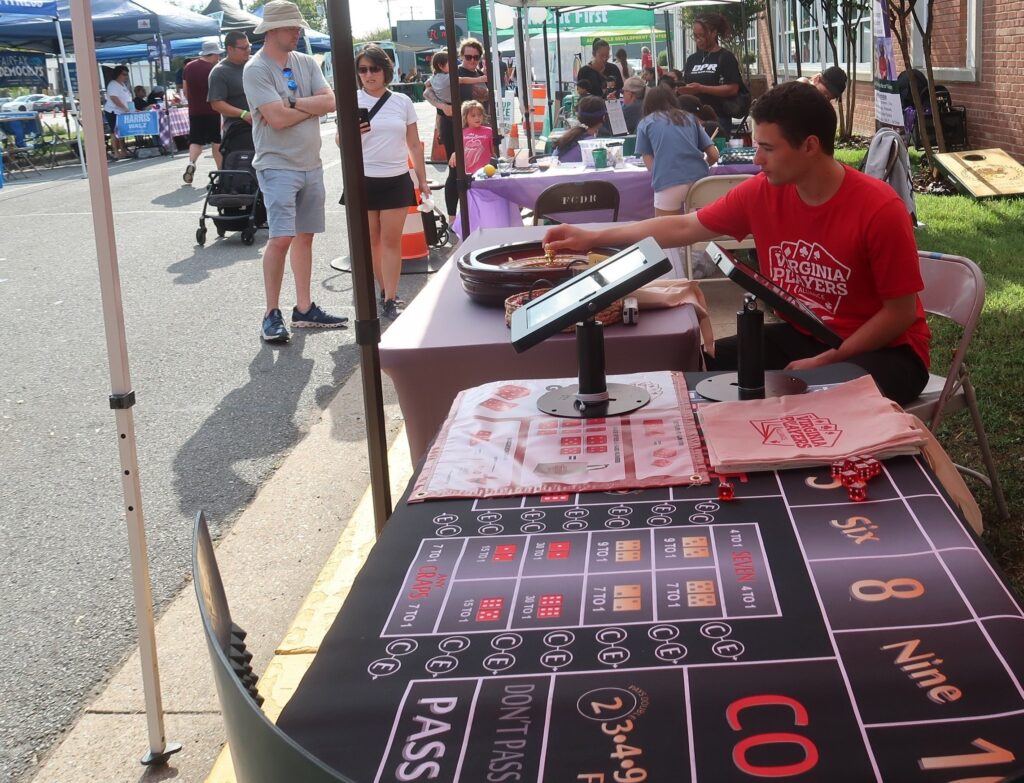A proposed casino in Tysons – economic benefits vs. social ills

Supporters of a casino in Tysons spoke about the economic benefits from the tax revenue at a forum on Jan. 7 hosted by the Fairfax County NAACP. The lone panelist against a casino argued it would promote crime and other social ills and would not lead to economic growth.
Earlier that day, Virginia Majority Leader Scott Surovell (D-Mount Vernon) introduced legislation in the state Senate to add Fairfax County to the list of localities authorized to host a casino.
While the measure doesn’t mention Tysons, it says sites considered for a casino must be located within a mile of a Metro station on the Silver line and be part of a mixed-use project of at least 1.5 million square feet, within two miles of a large regional mall, and outside the beltway.
A huge project proposed
Comstock Holding Cos. Inc. is proposing a 6 to 8-million square-foot mixed-use development to include a casino, convention center, hotel, performing arts center, and multifamily housing at the Spring Hill Metro station in Tysons.
If Surovell’s bill passes, Fairfax County could hold a public referendum on a casino, although the Board of Supervisors hasn’t taken an official position on whether it will do so.
At the forum, Comstock Vice President for Development John Harrison said Virginians spend about a hundred million dollars at casinos in Maryland.
“Fairfax County needs the tax revenue,” said Terry Clower, director of the Center for Regional Analysis at George Mason University. The commercial tax base is facing slower growth, which means the county will need to raise the tax rate and is likely to impose a meals tax.
According to Clower, the taxes generated by the casino and an entertainment complex could reduce the tax burden on residents.
Most of the gaming revenue would go to the state, but the tax revenue from the other components of the project would benefit Fairfax County.
Union jobs
Lynn Mulston, chair of No Fairfax Casino, a coalition of 27 community associations and HOAs representing over 50,000 voters, said, “a casino in Tysons would be bad for the community fiscally, economically, and socially.”
The project would create an unprecedented opportunity for blue-collar workers to enter the middle class, said Virginia Diamond, president of the Northern Virginia Labor Federation.
NOVA Labor negotiated an agreement with Comstock to allow 5,000 workers on the project to unionize and thus push for higher pay. “This would be transformational,” Diamond said. “It would create a complete change in the fabric of Fairfax County for immigrants and blue-collar workers.”
“We started our relationship with organized labor very early in the process,” said Harrison. “We are committed to be a real game changer for the community.”
Gambling addiction
The economic benefits from a casino would not offset the social costs of crime and gambling addiction, Mulston said. “Every tax dollar gained from a casino is accompanied by three to five dollars in social costs.”
She cited data from the Prince George’s County Police Department showing a 14,641 percent increase in the number of offenses in a three-year period around National Harbor after the MGM casino was built.
If a casino is developed in Tysons, Mulston predicts at least 5 to 10 percent of regular visitors will develop gambling addictions, leading to financial distress for families and broken homes.
She cited the case of a young man who placed a $10,000 bet on the Stanley Cup, lost, and kept on gambling to try to win it back. He ultimately committed suicide.

Mulston also cited problems with traffic and drunk drivers. Casinos are open 24/7 which would put unsuccessful gamblers with road rage on the road in the early morning when kids are heading off to school, she said.
According to Clower, “just 1 to 2 percent of the population are problem or compulsive gamblers.” There are so many other ways to feed the habit, such as sports betting on a phone. “I don’t think we’ll see a shift in gambling problems here; 30 percent of the people at MGM are there for the entertainment, not gambling.”
“In any entertainment venue, it’s not uncommon to have some increase in property crime, like purse snatching,” he said.
“A high-end entertainment resort casino is probably the safest place to gamble,” Harrison added. “A regulated gaming facility has cameras everywhere. Criminals realize that and go somewhere else.”
Related story: Casino bill off the table – at least for 2024
In response to questions about how the county would use revenue from the non-casino components, Clower said, it would be part of the general budget and distributed like any other resources. He recommended against dedicating the funds to a specific use, such as education, as that limits flexibility.
“The proposed tax revenue is miniscule compared to the [$3.7] billion school budget,” Mulston said. Besides, when funds are earmarked for schools, other funds are often shifted away from education.
Clower does not expect Fairfax County to provide tax incentives for the casino. There might be public-private partnership for the convention center, though, Harrison suggested.
“While we are not in dire economic straits, we have more threats and challenges building on the horizon,” Clower said. “We can no longer rely on office development.”
Mulston said, “The county can enjoy good jobs and tax revenue through an entertainment district without a casino.”


To me, a casino is the sign of a jurisdiction throwing in the towel on durable economic growth and civic development. Sad that Fairfax’s electeds are so ready to throw in the towel. Maybe they’re sending a signal that residents should cast their eyes, and their fortunes, in towards other jurisdictions with better prospects?
100% agree that the Board of Supervisors has just given up.
It appears to me that a Tyson’s Casino is a certainty, unless the voters of Fairfax County must pass a public referendum approving the casino.
It appears that Virginia and Fairfax County Democrats are lining up in support, and not enough Republicans will oppose (because many Republicans remain “free market” Libertarians).
Just like the meals tax, which was rejected twice by the voters of Fairfax County, but is now considered a certainty (just a matter of when) under the current Fairfax County Board; if the Tyson’s Casino requires only a majority vote of current Fairfax County Supervisors, I’ll be betting big on it happening on some legal online betting website.
A comment of constructive, but blunt, simple criticism, of the leadership of the “No Fairfax [Tysons] Casino.
Your purposeful (or perhaps, you’re just ignorant) of the color red for your organization — for example, in your T-Shirts and Signs — is counterproductive.
Your organization and movement should be nonpartisan/bipartisan. Don’t solely or predominantly use a color that is immediately recognized (unconsciously, if not consciously) as the color of one of the two major political parties.
And, if you are going to use the color of one of the two major political parties, why would you use the color of the political party that is far and away the minority party in Fairfax County?
If I wanted to waste my money, I would burn it in my fireplace before I donated to your ill-conceived and ill-run organization. At least it would generate some heat to warm my tiny house.
So many jurisdictions want to put in the casino and promise so many economic benefits. They promised dollars to education and social reform, etc. Check the fax. None of it ever comes to fruition. The same thing is gonna happen in Tysons. I find it hard to believe that we live in one of the counties with the highest tax rate in this country and we can’t match to make ends meet? Are you gonna drop my real estate taxes? No, I don’t think so. Also, I would look at the crime rate in PG County since MGM moved in. There are constantly reports of violence and shooting over there. And the claims to be a “high-end” entertainment complex? Yeah, that’s what MGM thought, too. And all the top chefs who had restaurants there when it opened, have pulled out. It’s a smoke screen. I’m sure somebody’s pockets are getting lined though…
The thing that bothers me the most is that the “Entertainment Complex” will change the fundamental nature of Tysons, both economically and socially. Economically, Tysons is currently composed of businesses and retail. With the implementation of a 35 acre “Entertainment Complex” the economic nature of Tysons shifts towards tourism and retail, with a decreased emphasis on the business component. Unfortunately, both the tourism and retail industries are much more dependent on discretionary income. Therefore, the switch is a risky gamble (no pun intended). During good economic years, tourism and retail could do very well, however, during bad economic times, tourism and retail does not do as well and will result in a worse economy. As far as providing jobs, in bad economic times entertainment complexes, just like every other industry, lays off employees. Therefore, many of the workers will end up getting laid off during difficult times.
This is not rocket science, so I would think that Senator Surovell, Virginia Diamond and Dr. Clower are all aware of these simple observations, however, they seem to be looking for quick, short-term fixes. We really should be getting more analysis and ideas from our leaders on how to grow a successful, long-term economy for Fairfax County.
Let’s say the quiet part out loud: the last thing any honest resident wants is Maryland and D.C. people all over Tyson’s. Look what happened to the mall. I won’t even bring my grandkids.
I would ask why Professor Clower has reversed his “Hell, No!” to now support the Casino. Last year he he suggeted that with so many casinos being built, chances of continued success were doubtful.
https://virginiamercury.com/2023/02/13/why-some-think-going-all-in-on-a-fairfax-county-casino-would-be-a-bust/
Is it because his school is named after a Comstock shareholder? I don’t know, but I do think an outside reviewer might alleviate the fear of favortism.